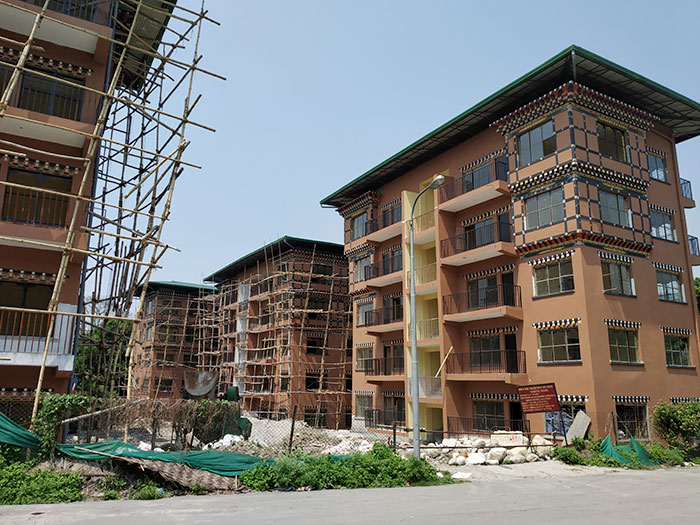Innovative Approaches to Affordable Housing Looking at Phuntsholing City
The document titled “Innovative Approaches to Affordable Housing: Looking at Phuntsholing City” explores the pressing issue of housing affordability in Phuntsholing, Bhutan, while proposing innovative solutions to enhance access to affordable housing. As one of Bhutan’s rapidly urbanizing areas, Phuntsholing faces significant challenges in providing adequate housing for its growing population, particularly for low- and middle-income residents.
Further reading:
NHDCL to build 1,000 affordable rental housing units | Kuensel Online
[PDF] Bhutan: Affordable Housing Development Sector Project ewsdata.rightsindevelopment
[PDF] 54355-001: Green and Resilient Affordable Housing Sector Project adb

Context of Housing Affordability in Phuntsholing
Phuntsholing has experienced a surge in population due to economic opportunities and migration, leading to an acute housing shortage. The document highlights that approximately 58% of urban households in Bhutan are renters, with many spending over 30% of their income on housing. This situation is particularly dire for low-income families who often face severe rent burdens, sometimes exceeding 40% of their monthly income. The need for affordable housing is critical, as many residents live in informal settlements or temporary accommodations.
Current Initiatives and Challenges
The government has recognized the housing crisis and initiated various programs aimed at improving access to affordable housing. However, the document points out that these initiatives have not sufficiently addressed the underlying issues. Key challenges include:
- High Construction Costs: Rising material costs and labor expenses make it difficult for developers to offer affordable housing options.
- Land Use Regulations: Strict zoning laws and land use policies complicate the development process, limiting the availability of land for housing projects.
- Limited Financing Options: High-interest rates and stringent lending criteria restrict access to affordable financing for potential homeowners.
Innovative Solutions Proposed
To tackle these challenges, the document proposes several innovative approaches:
1. Public-Private Partnerships (PPPs)
The establishment of public-private partnerships can leverage resources and expertise from both sectors. By collaborating with private developers, the government can create more affordable housing units while ensuring that projects align with community needs.
2. Land Pooling Initiatives
Land pooling is highlighted as a successful strategy employed in other regions of Bhutan. This approach involves assembling land from multiple owners to create larger plots suitable for development. In exchange for a portion of their land, owners receive smaller plots with improved infrastructure, increasing overall land efficiency and enabling the construction of affordable housing.
3. Prefabricated Construction Techniques
Utilizing prefabricated construction methods can significantly reduce building time and costs. The document suggests that adopting modern construction techniques can help lower expenses associated with traditional building practices while maintaining quality standards.
4. Integrated Community Services
The proposal includes creating integrated service centers within housing developments that provide essential services such as childcare, healthcare, and vocational training. These centers would support low-income families by offering resources that enhance their quality of life and economic stability.
5. Enhanced Financing Mechanisms
Improving access to financing through government-backed loans or subsidies can help low-income families secure affordable housing. The document advocates for developing financial products tailored to the needs of these households, facilitating homeownership opportunities.
Policy Recommendations
The report emphasizes the need for a comprehensive policy framework that addresses both supply and demand aspects of approaches to affordable housing:
- Streamlining Regulations: Simplifying land use regulations can expedite the development process and increase the availability of land for housing projects.
- Capacity Building: Training local authorities and developers in innovative construction methods and project management can enhance efficiency and effectiveness in delivering affordable housing.
- Data-Driven Decision-Making: Establishing a robust data collection system on housing needs and market trends will enable better planning and policy formulation.

Conclusion
In conclusion, the document underscores the urgent need for innovative approaches to affordable housing address the growing housing affordability crisis in Phuntsholing. By leveraging public-private partnerships, implementing land pooling initiatives, adopting modern construction techniques, and enhancing community services, Bhutan can create sustainable solutions that meet the needs of its urban population. The proposed strategies aim not only to alleviate immediate housing shortages but also to foster long-term social stability and economic growth in Phuntsholing and beyond. Addressing these challenges through targeted policies will be crucial in ensuring that all residents have access to safe, adequate, and affordable housing options as Bhutan continues to urbanize rapidly.
